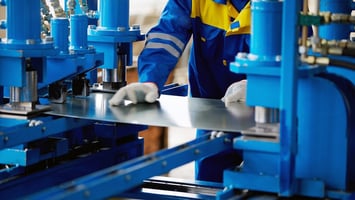The cost of metal fabrication is inexorably tied to its quality. Each project’s budget must...
Kryton Metals Blog
Should Manufacturers Care About ISO Certification for Metal Fabrication?

Precision manufacturing typically involves the use of high-tech machinery and techniques to create parts and products to exact specifications. To maintain consistent quality, there are often strict regulations within each industry that must be followed.
In many cases, an ISO certified fabrication shop may be the best option for metal fabrication projects. ISO certification indicates that the fabrication shop has met certain standards for quality management and that its products and services can be trusted. This is especially important in essential supply chains where consistency and reliability are crucial.
What Does It Mean to Be ISO 9001:2015 Certified?
An ISO certification means that a metal fabrication facility has demonstrated a legitimate ability to meet and maintain specific industry requirements. Because many U.S. companies enjoy international trade deals, it’s important for their quality standards to stay the same across borders. In fact, ISO stands for “International Organization for Standardization.”
Measurement systems vary throughout the world, but ISO helps translate various protocols to create accurate parts and components despite that. As a favored international standard that’s used by millions of manufacturers, it’s often the anchor of a facility’s quality management system (QMS).
The ISO 9001:2015 can provide a wealth of information to any fabrication shop. But it’s not easy for a metal manufacturer to achieve this coveted certification. Certified facilities must meet and maintain specific requirements, including these four:
#1. Follows the ISO 9001 Standard
The strict manufacturing standards laid out in the ISO are put there for a reason. So, a fabrication shop must have the tools, talent, and machinery to meet or exceed those standards on a regular basis.
#2. Meets Customer Requirements
Certification is about more than just following the rules. A metal manufacturing facility must figure out how to meld standards with client requests to develop functionally acceptable parts.
#3. Meets Shop Objectives
Each metal fabrication facility has a unique set of goals for the industries they serve. Too few orders make them inexperienced, and too many make them overwhelmed, although it may not apply to all metal fabrication facilities as some facilities may be capable of handling smaller or larger orders without compromising their experience or quality of work. Shop objectives help keep the floor running efficiently.
#4. Maintains Updated Documentation
The ISO regulatory process requires frequent and regular audits of certified fabrication companies. So, facilities must develop an accurate records system to prove their consistent adherence to regulations.
The fact that an ISO 9001:2015 certification is hard to get can help clients determine their best metal manufacturing partner. Its existence sets a shop apart from the competition. The certificate also suggests tighter tolerances on a wider range of materials, and precision components with measurable repeatability across numerous industries.
Which Industries Require ISO 9001:2015 Certification?
ISO 9001 is used by countless industries to develop and fabricate metal parts that can be shipped around the globe. The certification can be beneficial to any industry that relies on metal fabrication or production.
Additionally, while ISO certification can increase confidence in a metal fabrication shop, it’s not a guarantee of quality, and clients should still do their due diligence when choosing a partner.
The following industries typically depend on it the most:
- Construction
- Manufacturing
- Technology
- Community Services
- Healthcare/Medical
- Engineering
- Electrical
- HVAC
- Automotive
- Aerospace
- Agricultural
- Food and Beverage
- Furniture Making
- Oil, Gas, and Petrol
- Hospitality
Because ISO makes a metal fabrication shop more dependable, clients generally proceed with more confidence. Consumers, investors, and vendors benefit from it too. Meanwhile, there’s a significant difference between an ISO-certified facility and one that operates without the same credentials.
What’s the Difference Between an ISO 9001:2015 Fabricator and a Non-Certified Fabricator?
A manufacturing company that lacks an ISO 9001:2015 certificate can’t always keep up with the industry it serves. These facilities are usually smaller as well. They’re not as technologically advanced either. And they’re less able to meet short deadlines or maintain consistently tight tolerances because of that.
Most project managers understand how crucial these elements are. Being competitive within a thriving industry is the lifeblood of our economy. And since everyone is looking for high quality outcomes at the lowest possible price, this certification may be the biggest key.
It’s important to note that not all successful manufacturing companies have this certification. It’s possible for a smaller or less technologically advanced facility to still produce high-quality parts and meet tight tolerances without being ISO certified, but for companies that rely heavily on international trade and need to demonstrate consistent quality standards, an ISO certification can be an important factor in securing contracts and building trust with clients. Ultimately, the decision to purse ISO certification should be based on the specific needs and goals of the manufacturing company.
Why Manufacturers Should Care about International Standardization for Metal Fabrication
The overarching objective of the ISO 9001:2015 certificate is to reduce manufacturing risks and improve fabrication quality. It is not designed to guarantee a shop’s ability or reputation. Still, it’s an indication that the safest and most efficient processes are used on the floor.
This certification also helps shops satisfy large-scale manufacturing orders as well as small-batch projects. Moreover, it allows companies and clients to prove their legitimacy within closely regulated industries. In fact, a lack of documentation showing a shop’s standard operating procedure may affect an industry’s reputation in the long run.
As a competitive manufacturer, it’s your job to develop and create safe and functional components for your products. It’s also important for you to establish and maintain your credibility with vendors, partners, and customers around the globe. With an ISO 9001:2015 certification, that’s possible. Without it, probably not.
Find Out More
KRYTON Engineered Metals proudly holds an ISO 9001:2015 certificate and has successfully passed every audit since achieving it. Furthermore, we use those regulations alongside innovative design concepts to fabricate groundbreaking components. Lift your project off the ground with a quick quote request or reach out to our customer service team today.



